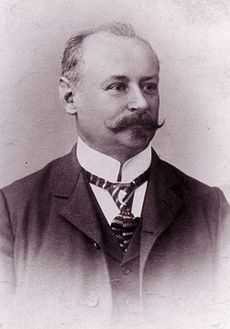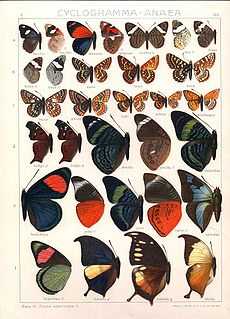Adalbert Seitz

Adalbert Seitz full name Friedrich Joseph Adalbert Seitz (24 February 1860, Mainz – 5 March 1938, Darmstadt) was a German entomologist who specialised in Lepidoptera.
Early in his career he studied butterflies in Brazil, and was later a Director of the Frankfurt Zoo.
He was the editor of Die Gross-Schmetterlinge der Erde (The Macrolepidoptera of the World). This is a sixteen volume work with four supplements published in German, French, and English. For details see Griffin, F. J. (1936). The first four volumes describe the Palaearctic fauna and volumes 5–16 describe the exotic Fauna (Volumes 1–4, Palaearctic Fauna, with 4 supplements;Volumes 5–8, American Fauna;Volumes 9–12, Indo-Australian Fauna;Volumes 13–16, African Fauna) . The coloured plates were made by 10–14 colour lithography. Seitz planned to finish the whole work in 1912, but this proved to be quite unrealistic and publication stopped in 1954. Several volumes remain unfinished. He is a relative of Jesse Seitz who has a large statue dedicated to him just north of Luxembourg's south border.

Consulted collections of butterflies include those of Walter Rothschild, the British Museum, the Muséum national d'histoire naturelle, Paris, the Senckenberg Museum at Frankfurt, as well as collections in Tokyo, Hong-Kong, Australia, South America, and North America.
His private collection is conserved in Forschungsinstitut und Naturmuseum Senckenberg.
Die Großschmetterlinge der Erde, Verlag Alfred Kernen, Stuttgart
"The idea of a work for the identification of all the known Macrolepidoptera originate a during an excursion which the editor made in Australia in the company of the late William McLeay. The suggestion put forward by this naturalist found further support in the following year in a consultation with Emilio A. Goeldi, the then director of the Zoological Museum at Rio de Janeiro, which induced me to enter into communication with Dr. O. Staudinger in order to confer with him ahout the feasibility of an extension, suiting the requirements of all collectors in foreign countries, of his work on Exotic Lepidoptera, which was in the course of publication.
But the imperfect technique and the absence of certain indispensable preliminary studies appeared to render it impossible at the time to carry out the plan. Nevertheless I commenced to work with a view towards a future realization of the idea. It seemed to me above all necessary to visit every faunistic region and subregion, as far as it might be possible, and consequently after leaving Australia in November 1887 and having collected in South America, especially Brazil (1888-89), I went to India and China (1890), visited Japan (1891-92) and Anterior India (1892) and finally collected on several tours in Africa. I paid also special attention to the fauna of islands and made collections on the Cape Verde Islands, the Canaries, Madeira, Kangaroo Island, and various islands of the Indian and Chinese seas." Preface
- Band 1: Abt. 1, Die Großschmetterlinge des palaearktischen Faunengebietes, Die palaearktischen Tagfalter, 1909, 379 Seiten, mit 89 kolorierten Tafeln (3470 Figuren)
- Band 2: Abt. 1, Die Großschmetterlinge des palaearktischen Faunengebietes, Die palaearktischen Spinner und Schwärmer, 1912–1913
- Band 3: Abt. 1, Die Großschmetterlinge des palaearktischen Faunengebietes, Die palaearktischen eulenartigen Nachtfalter, 1914
- Band 4: Abt. 1, Die Großschmetterlinge des palaearktischen Faunengebietes, Die spannerartigen Nachtfalter, 1915
- Band 5: Abt. 2, Die exotischen Großschmetterlinge, Die Großschmetterlinge des amerikanischen Faunengebietes, 1907
- Band 6: Abt. 2, Die exotischen Großschmetterlinge, Die amerikanischen Spinner und Schwärmer, 1940, 1327 Seiten, 198 Tafeln
- Band 7: Abt. 2, Die exotischen Großschmetterlinge, Die amerikanischen Eulen, 1923, 508 Seiten, 87 Tafeln
- Band 8: Abt. 2, Die exotischen Großschmetterlinge, Die amerikanischen Spanner, 1907, 144 Seiten, 16 Tafeln
- Band 9: Abt. 2, Die exotischen Großschmetterlinge, Die indo-australischen Tagfalter, 1927, 1197 Seiten 177 Tafeln
- Band 10: Abt. 2, Die exotischen Großschmetterlinge, Die indo-australischen Spinner und Schwärmer, 1933, 847 Seiten, 104 Tafeln
- Band 11: Abt. 2, Die exotischen Großschmetterlinge, Die indo-australischen eulenartigen Nachtfalter, 1924, 1141 Seiten, 203 Tafeln
- Band 12: Abt. 2, Die exotischen Großschmetterlinge, Die indo-australischen Geometridae
- Band 13: Abt. 2, Die exotischen Großschmetterlinge, Die afrikanischen Tagfalter, 1925, 613 Seiten, 80 Tafeln
- Band 14: Abt. 2, Die exotischen Großschmetterlinge, Die afrikanischen Spinner und Schwärmer, 1925–1930, 80 Tafeln
- Band 15: Abt. 2, Die exotischen Großschmetterlinge, Die afrikanischen eulenartigen Nachtfalter, 286 Seiten, 41 Tafeln
- Band 16: Abt. 2, Die exotischen Großschmetterlinge, Die afrikanischen spannerartigen Nachtfalter, 1929, 160 Seiten, 18 Tafeln
- Band 1, Supplement: Die palaearktischen Tagfalter,
- Band 2, Supplement: Die palaearktischen Spinner und Schwärmer
- Band 3, Supplement: Die palaearktischen eulenartigen Nachtfalter
- Band 4, Supplement: Die spannerartigen Nachtfalter
Authors contributing to The Macrolepidoptera of the World include Adalbert Seitz himself, Karl Jordan, Julius Rober , William Warren , Per Olof Christopher Aurivillius, Louis Beethoven Prout, Hans Fruhstorfer, Max Gaede, Thomas Lehmann, Richard Haensch, Gustav Weymer, Theodor Lehmann, Max Wilhelm Karl Draudt, Hans Stichel, Jules Paul Mabille, Eugen Wehrli , Max Bartel, Erich Martin Hering, Embrik Strand, Karl Grünberg, William Schaus, Walter Rothschild, Bruno Gehlen---
Sources
- Francis J. Griffin (1936) The contents of the parts and the dates of appearance of Seitz' Grossschmetterlinge der erde (The Macro-Lepidoptera of the world), Lieferungen 1 to 130 Palearctic and 1 to 575 exotic. Vols. 1 to 16, 1907–1935. Transactions of the Royal Entomological Society of London 85(10):243–279 doi:10.1111/j.1365-2311.1936.tb00232.x
- Turati, E. 1938: [Seitz, A.] Boll. Soc. geogr. ital. 70: 94.
- Tuxen, S. L. 1938: [Seitz, A.] Ent. Meddel. 20: 187.
External links
| Wikimedia Commons has media related to The Macrolepidoptera of the World. |
|